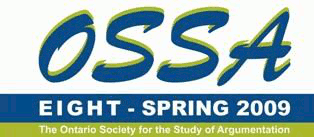
Location
University of Windsor
Document Type
Paper
Start Date
3-6-2009 9:00 AM
End Date
6-6-2009 5:00 PM
Abstract
The simplest statement of the relationship between consensus and dissensus is that arguments are supposed to begin in dissensus and end in consensus. This essay introduces a third state for argumentation, learned ignorance. Nicolas of Cusa’s De Docta Ignorantia (1440) lays out both a case and a logic for argumentation that is not designed to end in a clear conclusion. Instead, the arguer pursues a matter up to an inconclusive point, and ends there, satisfied with the results. The underlying logic of this view is centered on the “coincidence of opposites,” which requires rejection of the usual logical principle that A and not-A cannot both be true.
Creative Commons License

This work is licensed under a Creative Commons Attribution 4.0 International License.
Response to Submission
Christian Kock, Commentary on Hample
Reader's Reactions
Christian Kock, Commentary on Hample (June 2009)
Included in
Consensus, Dissensus, and a Third Way, Learned Ignorance
University of Windsor
The simplest statement of the relationship between consensus and dissensus is that arguments are supposed to begin in dissensus and end in consensus. This essay introduces a third state for argumentation, learned ignorance. Nicolas of Cusa’s De Docta Ignorantia (1440) lays out both a case and a logic for argumentation that is not designed to end in a clear conclusion. Instead, the arguer pursues a matter up to an inconclusive point, and ends there, satisfied with the results. The underlying logic of this view is centered on the “coincidence of opposites,” which requires rejection of the usual logical principle that A and not-A cannot both be true.
